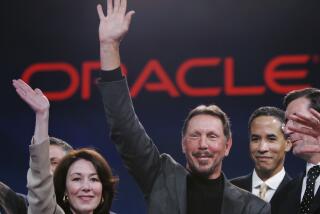Disney’s Eisner Gets Contract Extension Fit for a Lion King
Tomorrowland looks exceptionally lucrative for Michael Eisner.
Walt Disney Co. disclosed on Thursday that its chairman and chief executive agreed to a seven-year extension of his existing contract that puts him at the helm of the entertainment giant for the next decade and that should cement his place in the top tier of highest-paid corporate executives in history.
Eisner, who has reaped about $600 million since being hired in 1984 to turn around the then-ailing entertainment giant, is getting what compensation experts believe is the largest single grant of stock options ever given in one fell swoop to an executive--8 million options that are exercisable between 2003 and 2006.
However, a Disney director said that, adjusting for stock splits, the number of options Eisner is being awarded is roughly equal to the amounts he was awarded during previous contract negotiations in 1984 and 1989.
Disney’s proxy statement, released Thursday, assigns a hypothetical value to the new options of $196 million, according to a widely used mathematical model. The actual value can’t be estimated, because it is tied to Disney’s future stock price.
The extension of Eisner’s contract comes amid some concerns that the executive, who had heart bypass surgery two years ago, has no heir apparent. In December, the company announced that former Hollywood superagent Michael Ovitz was leaving as president after a rocky 14 months at the company. Eisner has said the company has no plans to hire a successor.
Disney director Raymond Watson, a member of Disney’s compensation committee, said Eisner’s new contract “ties him up for the rest of his career.” He added that it should also dispel any rumors that board members are worried about Eisner’s health. Eisner will be 64 in 2006 when the contract expires.
“We wouldn’t have done this if we believed he wasn’t going to live out this contract. He’s had the bypass surgery, as have thousands of other people. I had lunch with him today and he ordered a fat-free salad and fat-free pasta,” Watson said.
Added entertainment analyst Jeffrey Logsdon of Cruttenden Ross in Irvine: “Next to Mickey Mouse, Michael Eisner is Disney’s most important asset. This will help put to rest speculation by foolish people that he might retire.”
Separately, the Disney proxy also disclosed the expected details of another Disney pay package--the lucrative golden parachute Ovitz received after just 14 months on the job.
Ovitz’s severance package totaled $39 million in cash severance and 3 million stock options that were worth $31.5 million at the close of trading on Thursday. That puts the total package at $70 million today, although compensation experts believe that the value of his options could easily push the total value past $100 million.
Ovitz’s package last month was initially estimated at about $90 million--$50 million in cash and stock options then worth about $40 million. The total value--which rises and falls each day with Disney’s stock--is lower than that amount largely due to two factors: Disney’s stock price has declined since then, and Disney was allowed to discount $30 million in bonus payments Ovitz was to receive over four years because it paid him a lump sum. The only surprise in the package is that Ovitz didn’t receive a bonus for the fiscal year he served at Disney, which sources said both sides agreed to. He did receive another $1 million in salary payments, they said.
Disney has been criticized for paying such a large amount to Ovitz, who was tapped to replace Frank Wells, who died in a 1994 helicopter crash. Disney has been sued by angry stockholders miffed at the package.
Defending the Ovitz package, Watson said: “The Ovitz contract was practically a mirror image of what we did with Frank Wells and anybody else in a similar position. The only circumstances that arose here is that it didn’t last very long. It’s like doing a movie with Sylvester Stallone where you pay him $20 million and the movie loses money. It’s unfortunate.”
Eisner’s latest package puts him in the same neighborhood with such highly compensated executives as Coca-Cola Co. Chairman Roberto C. Goizueta, who has built a net worth estimated by Forbes magazine at $870 million while heading the soft drink giant.
In 1992, Eisner reaped $202 million when he exercised options. According to Disney’s proxy, he is sitting on options valued at more than $300 million that he can exercise now, and another batch that he can’t exercise yet valued at more than $60 million.
Despite the size of his compensation, Eisner has generally been immune from criticism by shareholders because his package is tied so heavily to the performance of the company. Virtually all of his wealth has come from boosting the price of Disney’s stock.
His base salary of $750,000 is the same as it was when he joined the company in 1984 from Paramount Pictures, where he earned the same salary. For 1996, Eisner earned $8.65 million--including a $7.9-million bonus.
“It’s a monstrous contract, but it has a significant amount of risk in it,” said executive compensation expert Graef Crystal, who designed the Ovitz package and consulted with Disney on Eisner’s package. “At the end of his contract, he’ll have had the same base salary for 22 years. I don’t know anyone who has gone that long without a raise.”
Under Eisner’s new package, his bonus threshold has been revised so that he receives one only if the company’s growth in earnings per share exceeds 7.5%. Under his old plan, his bonus was tied to a different measurement--return on equity.
(BEGIN TEXT OF INFOBOX / INFOGRAPHIC)
Details of the Deal
Walt Disney Co. announced a new long-term agreement with Chairman and Chief Executive Michael D. Eisner that could be worth hundreds of millions of dollars, with most of his compensation tied to the company’s performance. The key terms:
* Provides for Eisner’s employment through Sept. 30, 2006.
* Base salary of $750,000 per year, unchanged since 1984.
* Bonus formula tied to the growth of the company’s earnings per share.
* A grant of stock options for 8 million shares, with vesting beginning in 2003. The company estimates the value of the options at $196 million.
More to Read
The biggest entertainment stories
Get our big stories about Hollywood, film, television, music, arts, culture and more right in your inbox as soon as they publish.
You may occasionally receive promotional content from the Los Angeles Times.










